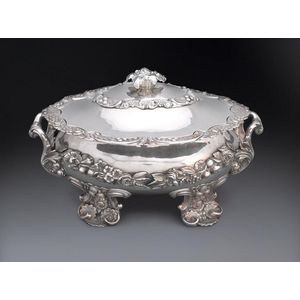Green Iridescent Hungarian Bird Figurines
You must be a subscriber, and be logged in to view price and dealer details.
Subscribe Now to view actual auction price for this item
When you subscribe, you have the option of setting the currency in which to display prices to $Au, $US, $NZ or Stg.
- Iridescent Decoration of Porcelain - Iridescent decoration of porcelain is a technique in which a thin layer of metallic glaze is applied to the surface of porcelain to create a shimmering, rainbow-like effect. The metallic glaze is usually made with a mixture of metal oxides, such as gold, silver, or platinum, that are fused to the surface of the porcelain during firing.
This technique was first developed in the late 19th century, and was particularly popular in Art Nouveau and Art Deco styles of decorative art. Iridescent decoration of porcelain can create a wide range of colours and patterns, depending on the types of metal oxides used and the firing techniques employed. It is a highly skilled and labour-intensive process, requiring a great deal of technical expertise and attention to detail. Today, iridescent porcelain remains a popular and highly valued form of decorative art. - Bronze - An alloy of copper and tin, traditionally in the proportions of about 9 parts of copper to 1 part of tin.
The discovery of bronze in Western Asia in the 4th century enabled people to create metal objects which were superior to those previoulsy possible because of its strength and hardness, and it has been used throughout the world for weapons, coins, tools, statuary and other decorative items.
It is very fluid in a molten state, and its hardness, strength when set, and non-corrosive properties makes it most suitable for casting sculpture.
This item has been included into following indexes:
Visually similar items

A pair of brass ships lanterns 35 cm

18th century Chinese blue and white sauce boat.

A George III sterling silver soup tureen, Benjamin Smith II and Benjamin Smith III, London, 1817 the body with cast and applied floral swags, raised on four scrolling shell form feet, having two scrolling handles emanating from acanthus, the domed cover wi

Antique octagonal table with inlay border, approx 75 cm high, 98 cm diameter
